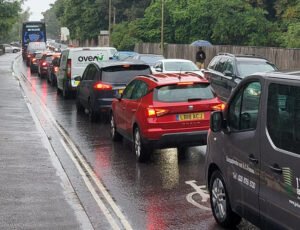Whose freedom are we talking about?
By Robin Tucker
Robin is Co-Chair of CoHSAT
Let’s talk about freedom.
On 18 February, around 2,000 people descended on Oxford to protest for freedom and against traffic filters. The demonstration included slogans promoting climate-change denial, anti-vax, anti-semitism and racism, but we’ll leave those for others. What concerns us here is their view of ‘freedom’.
In 1882 American J. B. Finch said “Your right to swing your arm leaves off where my right not to have my nose struck begins.”
As we examine it, this group’s view of freedom is a selfish and destructive one.
‘Freedom’ to drive?

Start by looking at the traffic. Lots of it, isn’t there? Freedom to drive results in traffic jams every day, and so people lose their freedom to move, stuck in queues of their own creation.
These drivers exercising their ‘freedom’ also take freedom from those in the 32% of Oxford households with no car, as well as others who aren’t driving. Because of traffic increases, bus services have slowed to 8–10 mph in the city, slower than a bicycle. Because this increases costs, bus companies have had to reduce some services.
Two-thirds of Britons consider the roads too dangerous for them to cycle. This removes their freedom to choose transport that is free of high fuel, service and environmental costs. Children have lost the freedom of independent travel that I enjoyed in the traffic-light 1970s and early 80s. In many places it’s even hard to cross the road.
Freedom to die?
For some, the loss of freedom is even more severe. In 2020, Ella Kissi-Debrah died at the age of 9. She was the first person to have air pollution recorded as a cause on her death certificate. Her mother now campaigns to reduce air pollution. The ways that cars make us less active also contribute to the 1 in 6 deaths, 100,000 a year, across the UK that are linked to physical inactivity. And, in the 10 years to 2021, we’ve seen 17,000 road casualties in Oxfordshire, with 258 fatalities.
I’m not saying that everyone should stop driving, but there’s a balance here and we need to be aware of the costs and the damage as well as the benefits that drivers gain.
How can we make transport fair?
So what to do when more people want to drive than there is space for? The current laissez faire approach only works for people with time to burn. It messes things up for buses and the small fraction of people who are dependent on cars for their mobility. Might it be better to prioritise certain users (e.g. those disabled people who rely on cars, buses that transport far larger numbers of people than cars) and then share out the remaining road with an allowance, so the traffic can flow?
Reducing traffic overall in this way would make it more appealing to walk, use a wheelchair or cycle – all of which cause less congestion and harm. Just like traffic lights at a junction, putting in place restrictions brings a fairer balance of freedoms. You may have already recognised this as the traffic-filter plan for Oxford.
Freedom that doesn’t cause harm
So when you hear someone talking about freedom, ask yourself: “Is this true freedom, that doesn’t take from anyone else?” If you are cycling down a quiet lane, or across the city, you’re not using resources, you’re not causing delays. A selfish view of freedom puts personal convenience before the loss of freedom for others.
To help children experience the freedom of cycling in a safe environment, even before our roads are fully engineered, Oxford, like many cities, hosts Kidical Mass events. In these rides a mass of cyclists, including experienced ride leaders, creates a safe space for children to cycle. Cyclox and partner organisations are holding Kidical Mass events on 26 March , 7 May and 24 September 2023. We’d love to see you there.

One Response
[…] have to forget the impact of car-dominance on the safety and quality of the environment. These costs fall on pedestrians and cyclists who have restricted space and the daily risk of injury. They fall on residents in neighbourhoods […]